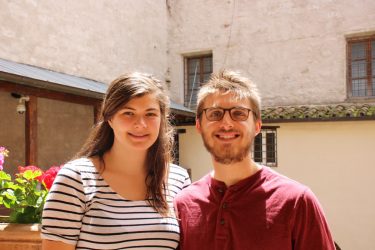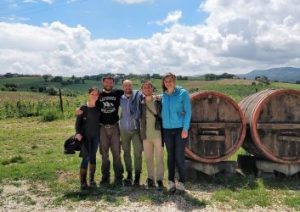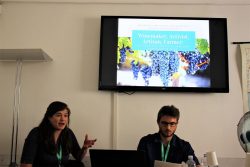Umbra Students Win Forum on Education Abroad’s 2018 Academic Achievement Award

When they left Perugia last summer, Mackenzie Nelsen and Jared Belsky may have thought that their experience at the Umbra Institute had come to an end. A few months later, they received word that the joint ethnographic research project, “Cultivating Activism Through Terroir: An Anthropology of Sustainable Winemakers in Umbria, Italy,” was selected as one of two winners of The Forum on Education Abroad’s 2018 Award for Academic Achievement Abroad. While she was excited that her students were recognized for their outstanding work, Dr. Elisa Ascione, Coordinator of the Umbra Institute’s Center for Food & Sustainability Studies, was not surprised by this honor. What impressed her most about these young social researchers was that they “immersed themselves in the lives and stories of winemakers, putting themselves in the shoes of a community of farmers promoting alternative, eco-friendly practices.” As Dr. Ascione explained, “They combined their interest in environmental sciences with ethnographic methods and insights, offering an original interpretation of the data and stories that they collected.”
The notification of this award included remarks from the faculty member who reviewed Mackenzie and Jared’s submission. It reads in part, “The project […] is an amazing example of the integration of an interesting topic, solid methodology, excellent undergraduate research, mentoring, and a study abroad opportunity. The topic is timely [given] increasing global emphasis on sustainability and farming in the age of sustained climate change.”
About The Forum and the Award
The mission of The Forum on Education Abroad is to serve “as the collective voice of U.S. post-secondary education abroad.” They work to develop standards of good practice and to provide resources and training to help their members achieve them. They also advocate for education abroad and promote its unique value.
As explained on The Forum’s website, “The Award for Academic Achievement Abroad is an honor that showcases rigorous and significant undergraduate academics that occur as part of education abroad programs… Academic achievement while abroad represents one of the highest accomplishments of undergraduate student learning. Conducting serious, high-quality academic work while abroad requires critical thinking, analysis, and creativity. The international context poses unique challenges and opportunities for understanding of other cultures and societies.”
In March, Mackenzie and Jared will give a presentation at the plenary lunch at The Forum’s 15th Annual Conference in Denver, Colorado about their experience at the Umbra Institute and their academic project. Over 1,400 international education professionals will be in attendance.
Makenzie and Jared’s Umbra Experience
This award is the culmination of Mackenzie and Jared’s unique Umbra experience. Mackenzie is an Environmental Science and Interdisciplinary Food Studies double major at University of North Carolina at Chapel Hill, and Jared is an environmental studies major at Hamilton College. During the Spring 2018 semester, they took two courses taught by Prof. Ascione: Anthropology of Food & Sustainability and Food Production in Italy. Mackenzie said that these courses were “very intellectually stimulating” and that she was learning not because it was a requirement but “for the excitement and joy of it.” Similarly, Jared said that he found Prof. Ascione’s anthropological approach particularly enlightening. By the end of the semester, they both decided to spend an extra two months in Perugia researching sustainable wineries in Perugia.
The Research

Jared and Mackenzie’s research focused on the figure of the vignaioli, an Italian word for both winegrowers and winemakers. “Our research is basically traveling to different wineries around Umbria and meeting with their owners to interview them about their specific viticulture practices and perceptions of terroir, sustainability, farmer identity,” Jared explained. They recorded, transcribed, and analyzed all of their interviews and observations. According to Jared, this was helpful because it was possible to go back and find answers to questions they had not asked during their visits. Jared adds, “We did qualitative research, analyzing sustainability through the point of view of our informants. We collected the data through Theoretical Sampling.” He continued, “We have also used Snowball Sampling, which means some of our fieldwork has been determined by the participants themselves; in this case, some of the winemakers we visited recommended that we go see another winery that wasn’t on our previous list.”
The research allowed Makenzie and Jared to deepen their knowledge about sustainable agriculture and about the motivations behind a farmer’s choice to produce sustainable wines. “One of the most memorable moments was when we saw a rally in the center of Perugia with lots of tractors,” Mackenzie said. “Most of the people we interviewed during field research were there, demonstrating for better regulations in the agriculture sector. We talked to them and they were so passionate about their work, so we understood their way of thinking. It was great to be there with them and share their concerns.”

Presenting at The Umbra Institute’s Food & Sustainability Studies Conference
Last June, Jared and Mackenzie had the opportunity to present her research at the Umbra Institute’s Food Conference, an event organized every two years that welcomes renowned food scholars from around the world. “It was very exciting,” Mackenzie comments. “Although it was a bit intimidating to present our research in front of other professionals, we felt the support of Prof. Ascione and the Umbra Institute.” As Mackenzie explained, this experience allowed them to develop some new skills, “In college, you write many essays, but here it was different because when you focus on one topic for so many weeks, you get so much material from your readings and the fieldwork. Having to synthesize all of that has been a learning experience that is important for my future.”
The Impact of the Umbra Experience
Overall, their time at the Umbra Institute has had a significant impact on Makenzie and Jared’s approach to their studies. “I’ve always focused on environmental sciences, and this was my first time doing anthropology,” Mackenzie said. “When I took Prof. Ascione’s classes, I really fell in love with her anthropological approach. I think it shifted my direction quite a bit because, coming from a food studies and sustainability perspective, I learned that anthropology is a great method to explore those ideas. So, this research experience gave me the opportunity to share what I’ve written and seen and, beyond the practical aspect, it reframed my way of thinking and the kind of the path of what I want to follow.”
Jared has also been thinking about how to take advantage of what he has learned. “I hope to develop this project as one half of a senior thesis for next year,” he said. “It would be interesting to do some sort of comparative analysis with terroir between wine in Italy and cider in the US.”
Everyone at the Umbra Institute is proud of Mackenzie and Jared on this great accomplishment. Congratulations!
To learn more about Food & Sustainability Studies at the Umbra Institute, click here.